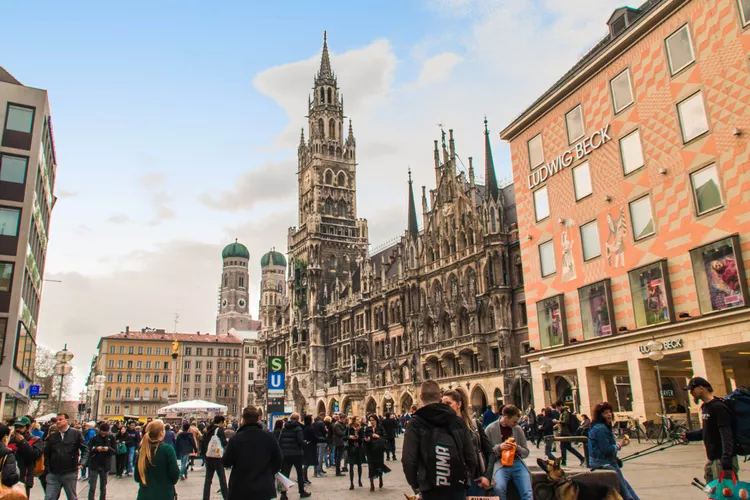Summary
History
Dating back to the 12th century, Marienplatz was founded by Henry the Lion, Duke of Bavaria. It used to host medieval markets, celebrations, and tournaments.
Various monuments were erected throughout the centuries, such as the Mariensäule in 1638 to signify the end of the Swedish invasion during the 30 Years’ War. Furthermore, the square underwent changes, including a name change from Schrannen to Marienplatz to plead with the Virgin Mary for protection against a cholera epidemic. It remained a marketplace until 1807 when the market moved to Viktualienmarkt. During the 1972 Munich Olympics, the square became a pedestrian area.
Today, Marienplatz is still at the center of action and serves as a popular meeting point for both locals and tourists alike.
How to Get There
Marienplatz is conveniently located in central Munich within the Altstadt. The actual address is 80331 Munich, Germany.
Additionally, it is well-connected to the rest of the city by the S-Bahn (local trains) and U-Bahn (subway) with its own stop, Marienplatz. The S-Bahn includes the S1, S2, S3, S4, S6, S7, and S8, while the U-Bahn is accessible via the U3 and U6. Notably, the S8 runs directly from the airport to Marienplatz.
What to See in Marienplatz
The first sight upon arriving at Munich’s Marienplatz is the impressive Neues Rathaus (New Town Hall), an elaborately decorated façade stretching 300 feet, adorned with hundreds of statues, turrets, and arches. Despite its medieval appearance, the building was constructed between 1867 and 1909 in Flanders Gothic style and houses the city government, along with the Munich Tourism Office.
The tower of the Neues Rathaus features the Rathaus-Glockenspiel, which performs daily at 11 a.m. and noon. Consequently, hundreds gather to hear the Glockenspiel chime and watch the 32 life-sized figures reenact significant Bavarian events. Keep an eye out for the golden bird that chirps three times to indicate the show’s conclusion.
In the center of the Marienplatz, you will discover the Mariensaule, the column of St. Mary. Topped with a golden statue of the Virgin Mary, the pedestal showcases figures on each corner representing the city’s triumph over war, pestilence, hunger, and heresy.
The Altes Rathaus (Old Town Hall) is located on the east side of Marienplatz and dates back to the 14th century. After the municipality moved to the New Town Hall in 1874 due to space constraints, the Old Town Hall was completely destroyed in World War II. However, it has since been rebuilt in neo-Gothic style and now houses Munich’s Spielzeugmuseum (toy museum), featuring a unique collection of historic toys from Europe and the U.S.
What to Eat and Drink in Marienplatz
This area can be quite touristy, often presenting higher-than-average prices with lower-than-average quality. Nevertheless, the ambiance and convenience may make it worthwhile.
Located within the Neues Rathaus is the Ratskeller restaurant, which offers a perfect atmosphere for a meal in Munich and features all the Bavarian classics.
Wildmosers provides a similar environment with relatively affordable prices, boasting tables situated right in front of the Glockenspiel, making it an ideal spot in good weather.
Nearby, the Viktualienmarket serves as the city’s premier farmers’ market, offering an abundance of fresh goods and prepared foods. Furthermore, the beer garden here meets all your food and drink needs in Munich.
What Else to Do Nearby
Marienplatz serves as a launching point for numerous attractions in Munich.
The primary shopping avenue, Kaufingerstrasse, commences here and offers a variety of retail experiences.
The twin towers of the Frauenkirche significantly define Munich’s skyline and are located just a short distance from the square. As the city’s largest church, it features intriguing highlights, such as the Teufelstritt, or “Devil’s Footstep.”
The English Garden is also a short stroll away, being the largest park in the city. Visitors can enjoy paddle boating, stroll on wooded paths, observe surfers, or relax in one of its traditional beer gardens. For the adventurous, nude sunbathing is also acceptable here.
During the Christmas season, Munich hosts its oldest Christkindlmarkt (Christmas market), which dates back to 1642 and sprawls across the square, showcasing handmade gifts and delightful treats. Additionally, enjoy free Christmas concerts from the balcony of Munich’s Neues Rathaus.




